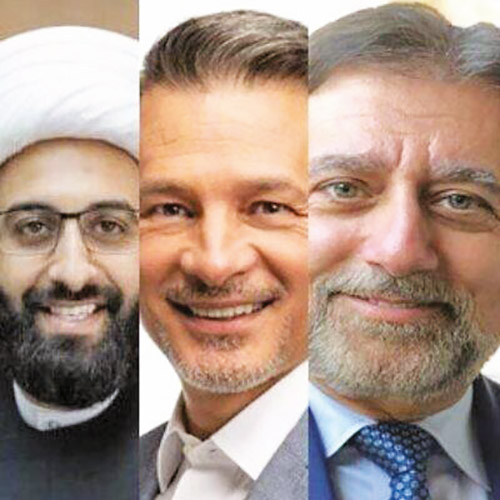
The three Abrahamic faiths must now come together to bring our shared values to the world.
With the announcement of the Abraham Accords, the world witnessed the impossible become possible. The nations of the Middle East were on the path to peace with their neighbors. The Accords proved that, under the right conditions, and in an incredibly short time, adversaries can become indispensable allies and even good friends. Such a tectonic shift in attitudes has paved the way for a new era of coexistence and a renewal of our common Abrahamic past, unprecedented since ancient times.
This new reality is a welcome blessing for the three Abrahamic faiths—Judaism, Christianity and Islam—and as such we were honored to attend a recent summit that celebrated the Abraham Accords and served to strengthen the Abrahamic values we all share. This first-ever Annual Abraham Accords Global Leadership Summit brought together representatives from six continents and nearly 40 countries, with many of the attending individuals being global leaders, diplomats, ambassadors, ministers and clergy from multiple faiths.
Significantly, the central focus of the summit was not only to celebrate the successes the historic Accords have brought to the region in just two years but, most importantly, the promise to bring people together to explore innovative ways to promote the values of the Accords—tolerance, religion, traditional family, economic peace and prosperity—in as yet unfathomed ways. The goal was to find ways to widen this new regional paradigm and explore novel approaches to replicate the peace and coexistence attained in the Middle East in other parts of the world, including in Europe, the Americas and beyond.

At the summit’s opening, we heard from leaders of the recently united Abraham Accords countries—the United Arab Emirates, Bahrain and Israel—as they shared their insights on the global impact of the Accords, provided an insider’s perspective and discussed the promotion of the values of the Accords. But the discussion went far beyond these countries. It encompassed other nations beyond the Middle East. World leaders, diplomats and entrepreneurs from Italy, Malawi, Slovenia, Finland, Poland, the U.K., South Sudan and the Czech Republic, among others, contributed their insights.
These leaders recognized that the Abraham Accords nations have, as a result of the ensuing peace, reaped the even greater fruits of economic prosperity, which, in addition to stability, has promoted open markets and enabled us to build a vibrant and close-knit society that is both entrepreneurial and innovative. The leaders delved into shared challenges, trends and threats faced by changing cultural norms in their countries and internationally. They raised the topics of the possibility of deeper and longer-lasting cooperation between nations and the importance of developing favorable governance policies on a local level. Discussions broadened to encompass how the values of respect and coexistence, as well as heritage and religion, are being actively challenged globally. Approaches to retaining our shared values, those that have allowed our communities to flourish throughout history, were considered.
It was truly meaningful for us, as representatives of the Abrahamic religions, to unite on stage in a conversation about our future. All three of us recognize the shared past that unites us and acknowledge that we must strive to build a common vision for our future. Critical to this collective future is our celebration of the traditional family unit and its core role in preserving the identity and culture of society. We all agreed during the conversation that our traditional family values are at the forefront of our Abrahamic heritage, and form the cornerstone of our societies, connecting us and preserving our identity and unique cultures. It is these traditional values that have sustained and allowed religions and cultures to impact the world constructively, resulting in society’s commitment to a strong sense of humanity.
At the close of the Summit we, alongside the attending global representatives, signed a pledge—the Abrahamic Values Pledge—to demonstrate our commitment to proactively continue to share Abrahamic values with our local communities in the spheres of academia, governance and community, and of course within houses of worship. This ceremony was a clear sign of the promise to come. Over 70 global leaders signed the pledge to further educate their communities on the fundamental significance of traditional Abrahamic values.
We envision that the connections created and the values shared will serve to impact local and global communities in significant ways in the coming year across communities, governments, media and religious venues. However, more than that, this historic, first-of-its-kind Abraham Accords Global Leadership Summit in Rome is certain to be a catalyst for compelling and powerful change. It has created a solid foundation and charted a road map that will pave the way for the years and decades to come. This is just the beginning.
The authors unite in peace and cooperation from the three Abrahamic faiths of Judaism, Christianity and Islam: Rabbi Dr. Elie Abadie is senior rabbi of the UAE and leader of the Association of Gulf Jewish Communities. Imam Mohammad Tawhidi is an Islamic scholar and vice president of the Global Imams Council. Pastor Carlos Luna Lam is the founder and pastor of Casa De Dios of Guatemala.
By Rabbi Dr. Elie Abadie, Imam Mohammad Tawhidi and Pastor Carlos Luna Lam/JNS.org












